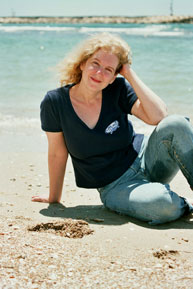Edeet Ravel
Tales from Tel Aviv

Edeet Ravel, MA'86, PhD'92, had been writing long before she came to McGill. Even as a young child growing up on a Marxist kibbutz in Israel near the Lebanese border, she had always thought of herself as an author. "I never chose to be a writer," she says in an email interview. "It was a part of who I was from the moment I knew what a story and a book were." Some of her earliest work included rewriting Cinderella at the age of five, in a bid to make the classic children's tale a bit more realistic.
Her parents moved back to her native Montreal when Ravel was seven. It was here where she spent her formative years, including penning her first novel at the age of 12.
Although Ravel returned to Israel when she was 19, she came back to Montreal again in the 1980s to do graduate work in Jewish studies.
Ravel might well have been writing for most of her life, but she was entirely unrushed to publish. "Each time I finished a story or novel, I thought 'The next one will be better,'" she says. Her first book, Lovers: A Midrash, an experimental and poetic work that slyly follows the rabbinical tradition of using one story to shed light on another, won Israel's Norma Epstein National Fiction Award in 1996.
Six years later, Ravel felt satisfied enough with her novel, Ten Thousand Lovers, to submit it for publication.
The book, a story about two lovers and two cultures trying to survive during the Palestinian-Israeli conflict of the 1970s, was released in 2003. Critics around the world heaped Lovers with praise and the book was nominated for several prizes, including the Governor General's Award. Needless to say, readers wanted more.
If Ravel took a somewhat relaxed approach to publishing her first two books, she wasted no time in producing a pair of critically acclaimed novels over the next two years in Look for Me and Wall of Light. Together with Ten Thousand Lovers, the books comprise what has come to be known as Ravel's Tel Aviv trilogy, painting a vivid picture of the Palestine-Israeli conflict and how it impacts the lives of everyday people on both sides of the divide, tackling everything from the nature of love to the use of torture.
Although the trilogy has gained notice for its collective power, all three books stand on their own – having each won or been in the running for a host of awards including, most recently, a Giller Prize nomination. And while Ravel maintains that awards do not change the writing process, they can change the writer. "Awards allow me to spend more time on writing. I have a very practical attitude to that side of things," she says. "If I can make enough to live on for another year, that means another year devoted entirely to writing. It's the most valuable gift I can receive."
Ravel is busy expanding her creative horizons, including penning a series of humourous novels about a teen named Pauline for younger audiences. Apart from an arthritic finger that troubles her when she types, her major obstacle is ars longa, vita brevis. "Everything interests me," she says. "My biggest problem is time is short and getting shorter. I'd need to live a thousand lifetimes to get to everything that interests me."


